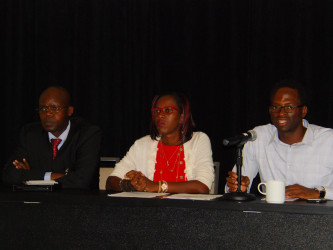The Society Against Sexual Orientation Discrimination (SASOD) continued to lobby for the rights of Lesbian, gay, bisexual, transgender and intersex (LGBTI) people to an adequate standard of living at the recent Session of the Committee on Economic, Social and Cultural Rights (CESCR), in Geneva, Switzerland.
SASOD presented its shadow report on the morning of September 28, 2015, while the state delegation, comprising Minister of Governance Raphael Trotman, Technical Officer in the Department of Governance Teresa Gaime and First Secretary of the Embassy of Guyana in Brussels, Belgium Bevon McDonald appeared before the committee during the afternoon of that day and the morning of September 29.
The state delegation presented and was questioned on the report that was submitted by the former government in 2012. This report combines the second, third and fourth periodic reports, covering an 18-year period from 1995 to 2012.

In a press release issued last week, SASOD said that in its shadow report to the CESCR, it called attention to the government’s failure to comply with Articles 6, 7, 11, 12 and 13 of the International Covenant on Economic, Social and Cultural Rights (ICESCR) in a number of areas.
These articles address individual and collective rights to an adequate standard of living, with equitable access to work, education and health services.
Specifically, SASOD said, the report noted that Guyana has failed to “enact and implement non-discrimination legislation to prohibit discrimination on the grounds of sexual orientation and/or gender identity in employment, housing, healthcare and education; lack of policies to prevent bullying and harassment of LGBTI students in the education system and effective mechanisms to seek redress; deficiency of sexuality education in schools that is comprehensive and inclusive of different sexualities and gender identities; and failure to repeal laws criminalising consensual sex between male adults in private and laws criminalising cross-dressing.”
Schemel Patrick, Advocacy and Communication’s Officer of SASOD who presented the report, provided a summary of the process to reporters at a recent media briefing last week.
Patrick noted that in its report SASOD called on the committee to recommend that Guyana “repeal the laws criminalising same-sex intimacy and cross-gender dressing and enact legislation prohibiting discrimination on the basis of sexual orientation and gender identity in all areas of public life, including employment, housing, health care and education.”
The organisation also asked that Guyana be encouraged to, among other things, include sexual orientation and gender identity within the list of prohibited grounds protected in the Prevention of Discrimination Act of 1997; improve the training of healthcare professionals to increase their understanding of and sensitivity to the specific health needs of LGBTI people; develop policies and imple-ment effective mechanisms to address bullying, harassment and discrimination against LGBTI students in schools and develop comprehensive sexuality education curricula inclusive of diverse sexualities and genders and addressing issues affecting LGBTI youth.
Also present at the media briefing was UNAIDS Country Coordinator Dr. Martin Odiit. Odiit noted that “discriminatory laws drive LGBTI persons underground, and thereby prevent them from accessing services which is a direct contravention of Article 12 of ICESCR which recognises the right of everyone to enjoy the highest attainable standard of physical and mental health.”





